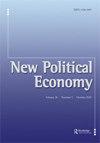“为未来创造财务意义”:精算师和气候相关金融风险的管理
IF 3.8
2区 经济学
Q1 ECONOMICS
引用次数: 6
摘要
摘要本文旨在探讨金融行业的专业人士如何理解气候变化给经济和社会带来的挑战。这是一个案例研究,探讨如何在精算专业的特定专业领域理解“气候相关金融风险”。金融监管机构越来越突出地主张,气候变化应被视为一个金融风险和稳定问题;有人认为,这将推动资本转向绿色目的和有序的低碳转型。对此,精算师正寻求将气候相关风险确定为其专业管辖权的一部分。然而,他们之所以难以做到这一点,是因为他们与投资链的关系,以及他们用于风险管理的工具(主要来自金融经济学)从根本上没有考虑、量化和金融化气候风险。相反,该行业正在转向基于情景的工具,以管理与气候相关的不确定性,其中包含有关政策干预和市场反应的叙述。本文借鉴了对英国精算师协会和学院(IFoA)成员的采访和民族志研究,探讨了这些成熟和新兴的风险管理工具和观点。本文章由计算机程序翻译,如有差异,请以英文原文为准。
‘Making financial sense of the future’: actuaries and the management of climate-related financial risk
ABSTRACT This paper seeks to explore how professionals in the financial sector understand the challenge that climate change presents to economy and society. It is a case study into how ‘climate-related financial risk’ is understood in a particular area of expertise – within the actuarial profession. There is an increasingly prominent claim among financial regulators that climate change should be considered as an issue of financial risk and stability; it is argued that this will drive capital towards green ends, and an orderly low carbon transition. Responding to this, actuaries are seeking to establish climate-related risk as part of their professional jurisdiction. Yet they are struggling to do so because of their relationship to the investment chain and because the tools they employ for risk management, mostly drawn from financial economics, are fundamentally failing to consider, quantify and financialise climate risks. Instead, the profession is moving toward scenario-based tools for managing climate-related uncertainty that incorporate narratives about policy interventions and market reaction. The paper draws on interviews and ethnographic research conducted with members of the UK-based Institute and Faculty of Actuaries (IFoA) to explore these established and emerging risk management tools and perspectives.
求助全文
通过发布文献求助,成功后即可免费获取论文全文。
去求助
来源期刊

New Political Economy
Multiple-
CiteScore
10.10
自引率
9.50%
发文量
41
期刊介绍:
New Political Economy aims to create a forum for work which combines the breadth of vision which characterised the classical political economy of the nineteenth century with the analytical advances of twentieth century social science. It seeks to represent the terrain of political economy scholarship across different disciplines, emphasising original and innovative work which explores new approaches and methodologies, and addresses core debates and issues of historical and contemporary relevance.
 求助内容:
求助内容: 应助结果提醒方式:
应助结果提醒方式:


